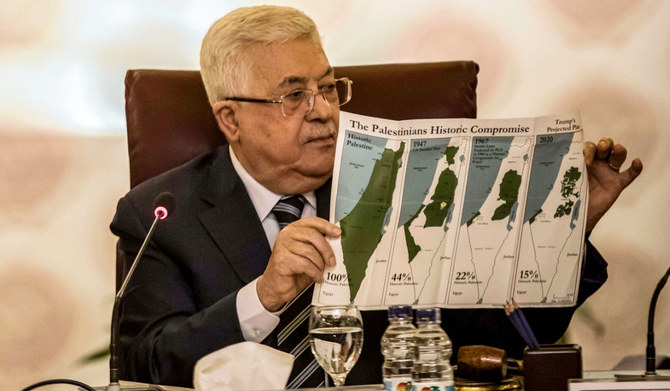RAMALLAH: Palestinian President Mahmoud Abbas on Friday called for an immediate end to the war in Gaza and an international peace conference to work out a lasting political solution leading to the establishment of a Palestinian state.
In an interview with Reuters at his office in Ramallah, Abbas, 87, said the conflict between Israel and the Palestinians in general had reached an alarming stage that requires an international conference and guarantees by world powers.
Besides Israel’s war with Hamas in Gaza, he said Israeli forces have intensified their attacks everywhere in the occupied West Bank over the past year with settlers escalating violence against Palestinian towns.
He reiterated his longstanding position in favor of negotiation rather than armed resistance to end the longstanding occupation.
“I am with peaceful resistance. I am for negotiations based on an international peace conference and under international auspices that would lead to a solution that will be protected by world powers to establish a sovereign Palestinian state in the Gaza Strip, the West Bank and East Jerusalem,” he said.
Abbas was speaking as Israel increased its strikes on Gaza. In two months of warfare, it has killed more than 17,000 people, wounded 46,000 and forced the displacement of around 1.9 million people, over half of them now sheltering in areas in central Gaza or close to the Egyptian border.
A senior US official said the idea of an international conference had been discussed among different partners but the proposal was still at a very preliminary stage.
“It’s one of many options on the table that we and others would consider with an open mind, but no decision has been made about that,” the official said on condition of anonymity.
Israel launched its campaign to annihilate the Hamas movement that rules Gaza after Hamas fighters went on a rampage through Israeli towns on Oct. 7, killing 1,200 people and seizing 240 hostages, according to Israeli tallies.
Abbas said that based on a binding international agreement, he would revive the weakened Palestinian Authority, implement long-awaited reforms and hold presidential and parliamentary elections, which were suspended after Hamas won in 2006 and later pushed the PA out of Gaza.
He said the PA had abided by all the peace deals signed with Israel since the 1993 Oslo Accord and the understandings that followed over the years but that Israel had reneged on its pledges to end the occupation.
DEMOCRATIC ELECTIONS
Asked whether he would risk holding elections given the possibility that Hamas could win as it did in 2006, he said: “Whoever wins wins, these will be democratic elections.”
Abbas said he had planned to hold elections in April 2021 but the European Union envoy told him before the due date that Israel was objecting to voting in East Jerusalem so he was forced to call it off.
He insisted that there would not be elections without East Jerusalem, saying the PA held three rounds of elections in the past that included East Jerusalem before Israel imposed the ban.
Israel captured Arab East Jerusalem in the 1967 Middle East war. It later annexed it, declaring the whole of the city as its capital, a move not recognized internationally. Palestinians want East Jerusalem as the capital of their future state.
Abbas did not give a concrete vision of a post-war plan discussed with US officials under which the PA would take over control of the strip, home for 2.3 million people. Israeli Prime Minister Benjamin Netanyahu has said that Israel would not accept rule over Gaza by the Palestinian Authority as it stands.
“The United States tells us that it supports a two-state solution, that Israel is not allowed to occupy Gaza, to keep security control of Gaza or to expropriate land from Gaza,” he said in reference to a plan floated by Israel to establish a security zone in Gaza after the war.
“America doesn’t force Israel to implement what it says.”
He said the PA was still present in Gaza as an institution and still pays monthly salaries and expenses estimated at $140 million for employees, pensioners and for needy families. The PA still has three ministers present in Gaza, he added.
“We need rehabilitation, we need big support to return to Gaza,” Abbas said.
“Gaza today is not the Gaza that you know. Gaza was destroyed, its hospitals, its schools, its infrastructure, its buildings, its roads and mosques were destroyed. There is nothing left. When we return we need resources, Gaza needs reconstruction.”
“The United States which fully supports Israel bears the responsibility of what is happening in the enclave,” Abbas said.
“It is the only power that is capable of ordering Israel to stop the war and fulfil its obligations, but unfortunately it doesn’t. America is an accomplice of Israel.”















